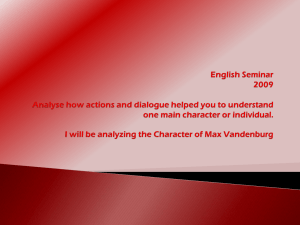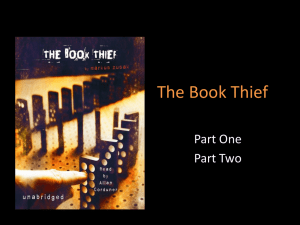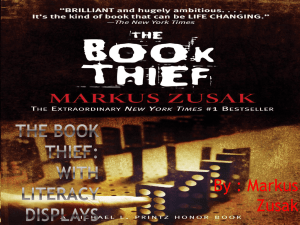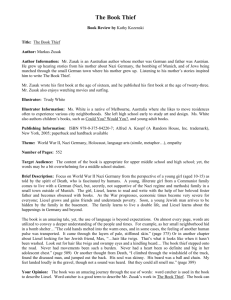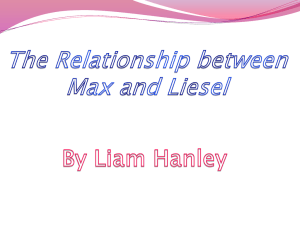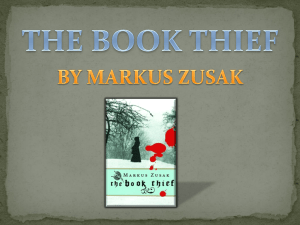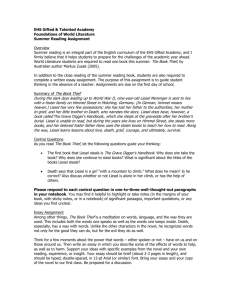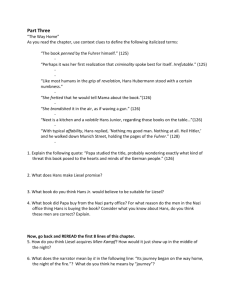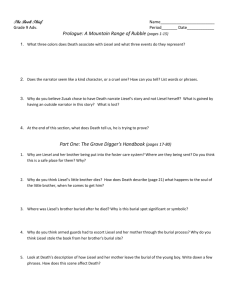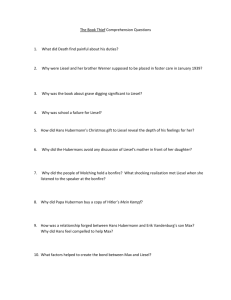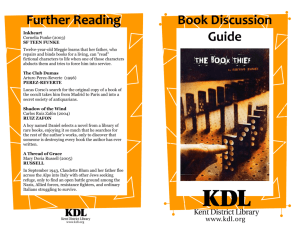The Book thief part 6x
advertisement
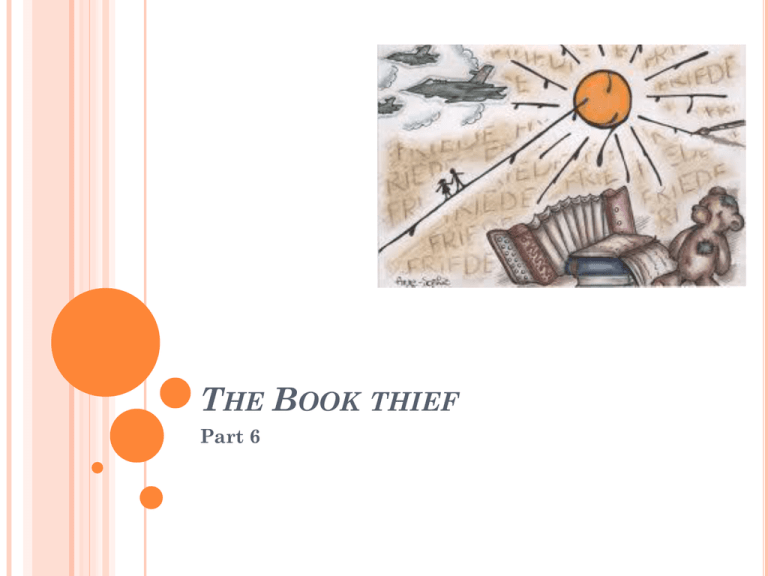
THE BOOK THIEF Part 6 WHAT DO YOU NOTICE ABOUT THE FRONT COVERS OF THE BOOK? HOW DO THE TEXT FEATURES HELP ME IDENTIFY WHY ZUSAK WROTE THE NOVEL? Text Features: (see handout) Photos Drawings Magnification Bold print Colored prints Italics Bullets Titles/headings **Basically, looking at each cover, what text features of each cover offer some sort of hint as to why Zusak wrote the novel, or what the novel is about?** DEATH’S DIARY: 1942 How does death feel about war? Is he in charge? If not, who is? “they often came after me as I wander through the streets of molested cities They beg me to take them with me, not realizing I’m too busy as it is……I complain internally as I go about my work, and some years, the souls and bodies don’t add up; they multiply” (308) The “cost” of war 3 HISTORICAL EVENTS REFERENCEDPAGE 308 “The desperate Jews”= concentration camps/holocaust/extermination camps “The Russian soldiers”= Battle of Stalingrad “The soaked bodies of a French coast”= D-Day on the beaches of Normandy Zusak uses this to frame the history of 1942, piling the deaths up in a way to express how exponentially deadly that period in human history was. PAGE 309 “SO MANY HUMANS, SO MANY COLORS” “They keep triggering inside me. They harass my memory. I see them tall in their heap, all mounted on top of each other. There is air like plastic, a horizon like setting glue. There are skies manufactured by people, punctured and leaking, and there are soft, coal-colored clouds, beating like black hearts.” *How does this Statement characterize the narrator’s feeling toward war? “skies manufactured by people” is referencing the bombing, the smoke from bombs, etc… 2ND REVOLUTION AND STALIN “THE MURDER OF HIS OWN PEOPLE” (309) Battle of Stalingrad http://www.history.com/topics/josephstalin/videos#world-war-ii-battle-of-stalingrad WAR IS LIKE A BOSS…OVER DEATH “To me, war is like the new boss who expects the impossible. He stands over your shoulder repeating one thing incessantly: “Get it done, get it done.” So you work harder. You get the job done. The boss, however, does not thank you. He asks for more.” What is the author’s purpose in having the narrator describe war as a boss? THE SNOWBALL SCENE Do you see the mix of lightness and darkness in this scene? Where? The scene from page 311 to 313 is light hearted and innocent. Reading these pages again, what about this passage helps readers to better “get to know” and understand the Hubermann’s as a family? How has your view of the family changed from the beginning? PAGE 313 MAX FALLS ILL “there was an accordion in their ears, a snowman in their eyes, and for Liesel, there was the thought of Max’s last words before she left him by the fire” (313) “This was no virus….it started with Adolf…” (315) Why is Max “ill?” Analyze how Max’s illness changes the complex character of Rosa; how has she developed since Max first arrived? PAGE 316 “IT WAS A PARADOX...” “He was the second snowman to be melting away before her eyes, only this one was different. It was a paradox….The colder he became, the more he melted.” What was the “first” snowman? How is this a paradox? Explain… Remember the definition of paradox: a statement or group of statements that leads to a contradiction or a situation which (if true) defies logic or reason, similar to circular reasoning 13 PRESENTS What is significant about the number 13? Do you think the author did this on purpose? #1- a deflated kick ball #2- one ribbon How is “gift searching” #3- one pinecone a distraction and way to cope for Liesel? #4- one button #5- one stone #6- one feather #7- two newspapers #8- a candy wrapper #9- a cloud Why do you think some of #10- one toy solider the gifts are literal while others are figurative? #11- one miraculous leaf #12- a finished whistler #13- a slab of grief A QUEST! Liesel puts herself on a mission, maybe to distract herself from the reality of Max’s condition, maybe for a sense of personal challenge, and maybe just a combination of any number of things. But she becomes determined to finish off The Whistler in a final journey. Did you know? The Whistler was an American radio mystery drama which ran from May 16, 1942 until September 22, 1955. It was sponsored by the Signal Oil Company DEATH VS MAX “it was nice to be fought off in that dark little room….” (318) From the narrator’s description of Max’s fighting, how can we (the reader) draw inferences that help to understand Death’s perspective of Max? Stylistically, the author is showing versus telling in this description of Liesel. Analyze in what ways the author has achieved this….In particular, determine the words within the phrase “It didn’t stop her from pulling a lump of salt water from her eye and feeding it into Max Vandenburg’s face.” (324) CLOUDS…. “…It was like a great white beast,” she said at her next bedside vigil, “and it came from over the mountains” (319) When the sentence is complete, with several different adjustments and additions, Liesel feels as if she’s done it. She imagines the vision of it passing from her hand to his (Hans), through the blankets, and she writes it down on a scrap of paper, placing the stone on top of it. Here, we have those clouds again. Do you remember the significance of the clouds in part 1? How is that same connection/significance illustrated in the above passage? CAN WORDS CURE MAX? Liesel uses The Dream Catcher to continue to hope that Max will be inspired by her words and wake up, that they’ll be able to laugh about their ridiculous journey and that something in her life will be ok. Two chapters a day. That’s what she reads to Max, one of them before she goes to school in the morning, the other the second she returns home. “She gave The Dream Carrier to max as if the words alone could nourish him. On a Tuesday, she thought there was movement. She could have sworn his eyes What “cracks?” had opened. If they had, it was only momentarily, and it was more likely just her imagination and wishful thinking…..By mid-March, the cracks began to appear” (328) PAGE 330 “HE’S NOT DEAD YET” “…a sentence dropped from her mouth. “He’s not dead yet.” The words landed on the table and positioned themselves in the middle. All three people looked at them. Half hopes didn’t dare raise any higher. He isn’t dead yet. He isn’t dead yet….” Reading this passage above, what is the tone of this scene? (see your tone hand out and next slide) What theme is suggested by the words in red? Predict: what would happen to the family if Max dies now? **Often a change or shift in tone will be signaled by the following: -Key words such as but, yet, nevertheless, however, although -Punctuation such as dashes, periods, colons, semicolons TONE WORDS! (SEE HAND OUT AS WELL- THESE ARE JUST A FEW) 1. accusatory-charging of wrong doing 2. apathetic-indifferent due to lack of energy or concern 3. awe-solemn wonder 4. bitter-exhibiting strong animosity as a result of pain or grief 5. cynical-questions the basic sincerity and goodness of people 6. condescension; condescending-a feeling of superiority 7. callous-unfeeling, insensitive to feelings of others 8. contemplative-studying, thinking, reflecting on an issue 9. critical-finding fault 10. choleric-hot-tempered, easily angered 11. contemptuous-showing or feeling that something is worthless or lacks respect 12. caustic-intense use of sarcasm; stinging, biting 13.conventional-lacking spontaneity, originality, and individuality 14. disdainful-scornful 15. didactic-author attempts to educate or instruct the reader MAX AWAKENS BUT SO DOES WAR…. War as a boss metaphor seen again: “yes, the boss was at my shoulder. Get it done, get it done…..The bombs were coming- and so was I” (335). We see this metaphor continued but what other metaphors, or comparisons, is the author making here when he aligns the awakening of Max to the awakening of war in Europe? “LUBECK WAS HAILED WITH BOMBS…NEXT IN LINE WOULD BE COLOGNE…” (PAGE 335) DEATH’S DIARY: COLOGNE From pages 336 to 338, the author presents strong images of death. We learn more and more about the war and Death’s thoughts on the war. “Five hundred souls. I carried them in my fingers, like suitcases. Or I’d throw them over my shoulder. It was only the children I carried in my arms” (226)image of death PAGE 336 “…the sky was yellow, like burning newspaper. If I looked closely, I could see the words, reporting headlines, commentating on the progress of war and so forth. How I’d have loved to pull it all down, to screw up the newspaper sky and toss it away. My arms ached and I couldn’t afford to burn my fingers. There was still so much work to be done…” (336) Death focuses on individual souls this time….how is the reader’s perspective of Death changing here? PAGE 337- EMPTY FUEL TANKS “The fuel,” “The tank.” “They used up the empty container. Look, there’s another one over there.” “And there!” “Kids being kids, they all searched frantically at that point, trying to find an empty fuel container floating to the ground.” “Just past the rubble of Cologne, a group of kids collected empty fuel containers, dropped by their enemies. As usual, I collected humans. I was tire. And the year wasn’t even halfway over yet.” The author is creating a metaphor here….to what is he comparing the empty fuel tanks? PAGE 340, “LSR” “Luft Schutz Raum: Air Raid Shelter” PAGE 341- CONTRAST “My papa,” she said. ‘They sky, she noticed, was utterly blue. Not even the suggestion of a cloud.’ “Could you get him, Rudy?” How could such terrible things happen on such beautiful days? The author creates a juxtaposition of scenes here….what effect does this contrast have on the reader? “YOU’RE ALIVE…WE ALL ARE” PAGE 346 “Max Vandenburg sat beneath the steps, holding his rusty scissors like a knife. His armpits were soggy and the words fell like injuries from his mouth” (345) IS THE WORLD A GOOD OR A BAD PLACE? “It was June. It was Germany. Things were on the verge of decay. Liesel was unaware of this. For her, the Jew in her basement had not been revealed. Her foster parents were not taken away, and she herself had contributed greatly to both of these accomplishments….” “Everything’s good,” she said, and she was not talking about a soccer injury of any description. She was fine.” (348) -What are some differences between the “physical” soccer injury and the “emotional” injury caused by almost losing Max? -We see contrast again in this passage. Explain… THIRD ENTRY OF “DEATH’S DIARY”- THE PARISIANS What does the author mean when he tells reader, “the sky was the color of Jews?” (349) “they just kept feeding me. Minute after minute. Shower after shower.” “the smell like a stove, but still so cold” **How does the author’s use of color symbolism create the feeling of tension or suspense? DEATH TALKS TO GOD…PAGE 350 “I shiver when I remember- as I try to de-realize it. I blow warm air into my hands, to heat them up. But it’s hard to keep them warm when the souls still shiver. God. I always say that name when I think of it. God. Twice, I speak it. I say His name in futile attempt to understand.” “But it’s not your job to understand.” That’s me who answers. God never says anything.” JUNE 23, 1942: GROUP OF FRENCH JEWS IN A GERMAN PRISON ON POLISH SOIL Actual historical event: Thousands of Lvov Jews are killed at Janówska, Ukraine, and Piaski, Poland. “EVEN THE CLOUDS WERE TRYING TO GET AWAY…” PAGE 350 “Please believe me when I tell you that I picked up each soul that day as if it were newly born. I even kissed a few weary, poisoned cheeks. I listed to their last, gasping cries. Their vanished words, I watched their lore visions and freed them from their fears.” Why Death so concerned with what we think of him? Analyze this particular view point and draw an inference. PAGE 350, “THEY WERE FRENCH, THEY WERE JEWS, AND THEY WERE YOU.” “…sun was blonde, and the endless atmosphere was a giant blue eye…” (350) Here, analyze how the author’s choices concerning word choice and imagery create contrast in the end of part 6.
